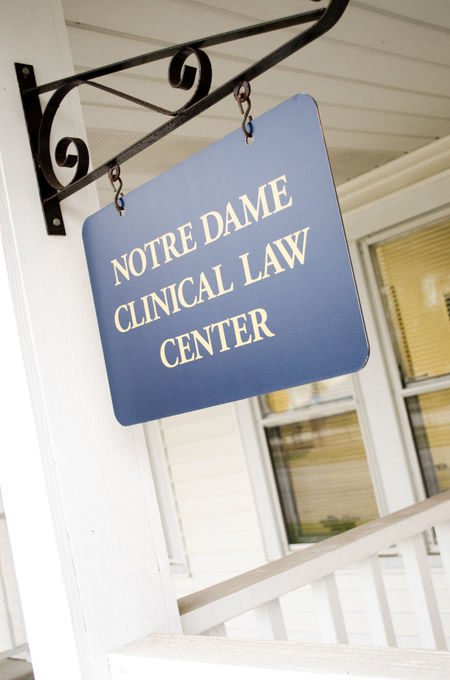Clinics

Clinics are teaching law offices where students work as lead attorneys on real cases under the close supervision of seasoned faculty members.
In Notre Dame Law School's clinics, second- and third-year students, as well as LL.M. students, receive academic credit while providing free legal services to individuals, small businesses, and nonprofit organizations in the South Bend region and around the world.
These experiences — which include litigation, transactional work, and mediation — complement the analytical training of the classroom by enabling law students to develop practical skills and explore potential career paths.
The clinics provide an invaluable service to those who cannot afford legal counsel and to organizations pursuing justice in many fields and many types of legal forums.
Notre Dame Law School operates seven clinics.
-
Applied Mediation: Provides mediation services to individuals litigating civil matters such as child custody, parenting time, landlord-tenant disputes, and contract disputes.
-
Community Development: Offers non-litigation services to nonprofit organizations and small businesses.
-
Eviction: Represents low-income clients in litigation with a focus on eviction defense and related matters.
-
Exoneration Justice: Committed to correcting the miscarriage of justice and investigating, litigating, and overturning wrongful convictions.
-
Global Human Rights: Represents individuals, organizations and groups combating human rights violations worldwide; provides human rights training and education, and assists with advocacy for legislative implementation of human rights and human rights driven-legal reform in States throughout the world.
-
Lindsay and Matt Moroun Religious Liberty: Protects not only the freedom for individuals to hold religious beliefs but also their right to exercise and express those beliefs and to live according to them.
-
Special Education: Serves parents of children with disabilities in the wider South Bend, Indiana area as they advocate for services, accessibility, and accommodations required for their children diagnosed with physical and mental disabilities.
The Applied Mediation Clinic, Community Development Clinic, Eviction Clinic, and Special Education Clinic are located in the Notre Dame Clinical Law Center at 725 Howard Street in South Bend. The Exoneration Justice Clinic operates out of offices across the street at 806 Howard Street. The Religious Liberty Clinic and the Global Human Rights Clinic are housed in Biolchini Hall of Law on Notre Dame's campus.
Information for potential clients
The Law School's clinics are able to accept only a limited number of new cases each semester. The clinics begin the intake process in the middle of August for the fall semester and early January for the spring semester.
Please call the Clinical Law Center's informational line at 574-631-6704 for updated information on which clinics are currently accepting new cases. Also, please consult the individual clinic pages (linked on the list above) to see each clinic's intake requirements.
The Notre Dame Clinical Law Center does not handle any types of cases not listed above or on the clinics' individual webpages, nor can it provide general legal assistance or advice to individuals who are not represented by the Clinical Law Center.
Mission statement
Notre Dame Law School was a pioneer in clinical legal education when it established a legal aid clinic in 1951, and the Law School continues to be a model of current, high-quality pedagogy.
The Notre Dame Clinical Law Center's mission is to provide effective learning opportunities for law students in the basic skills of law practice through (1) client representation, (2) classroom instruction, and (3) individual mentoring. In fulfilling this mission, the Clinical Law Center will strive to serve unmet legal needs of the poor and underrepresented in keeping with the Judeo-Christian tradition of working for social justice.
In keeping with the Clinical Law Center's mission, and with the aspirations and ideals of Notre Dame Law School, the clinical faculty will endeavor:
- To inculcate high standards of ethical practice by reflecting with students on their legal obligations as attorneys and the moral dimensions of law practice;
- To encourage students to become leaders in improving the administration of justice and to incorporate public service as an integral component of their legal careers;
- To contribute to the development of the law and the improvement of legal education through scholarly and other professional activities.